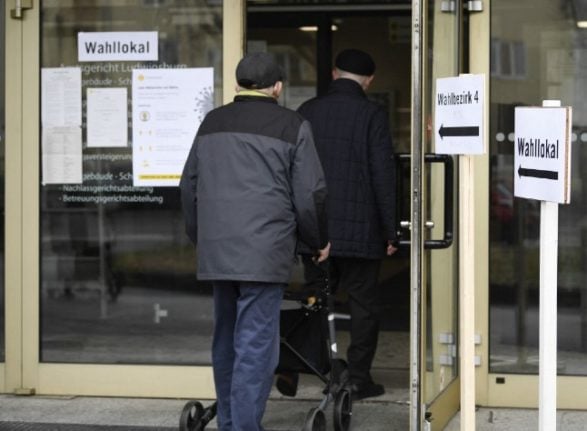The votes for new regional parliaments in the states of Rhineland-Palatinate and Baden-Wuerttemberg are seen as a bellwether of the nation’s mood ahead of September 26 general elections — which will be the first in over 15 years not to feature Merkel.
Things aren’t looking good for the conservatives. Recent surveys have shown that support for Merkel’s centre-right CDU/CSU alliance has fallen to a one-year low at around 30 percent as Germans sour on its coronavirus crisis management.
“Merkel’s CDU is facing a disaster,” the top-selling Bild tabloid said, calling the polls a “corona election”.
The conservatives, it said, should brace for “a slap in the face from voters” .
Merkel’s centre-right CDU and its Bavarian CSU sister party have been roiled by damaging claims about MPs apparently profiting from face mask deals early on in the pandemic, forcing three lawmakers to step down in recent days.
Deepening the conservatives’ woes is growing public anger about a sluggish and bureaucratic vaccination campaign, a delayed start to free rapid testing and stubbornly high infection rates despite months of shutdowns.
Germans could perhaps look past the “mask affair”, Der Spiegel weekly wrote, “if citizens felt that the government was doing its job, protecting it from the virus and guiding it through the crisis. But it’s not”.
READ ALSO:
- What you need to know about Germany’s face mask scandal
- Merkel’s party slumps in polls as mask purchase scandal widens
- What you need to know about Germany’s new mask rules for public transport and shops
In Rhineland-Palatinate, the centre-left Social Democrats (SPD) have overtaken the CDU in opinion polls, paving the way for popular state premier Malu Dreyer to head another coalition government with the Greens and the pro-business FDP.
Most closely watched will be the vote in Baden-Wuerttemberg, the only German state to have a premier from the Green party.
The left-leaning ecologists there currently govern together with the CDU, in what could serve as a blueprint for the first federal government of the post-Merkel era.
Opinion polls however show the CDU headed for its worst-ever result in the affluent southwestern state, while the Greens have widened their lead. The environmentalists have also seen their popularity rise nationwide in recent years, on growing concern about climate change.
The first exit polls are expected shortly after 6pm.
Because of the pandemic, a higher than usual number of voters cast their ballots in advance by mail.
Analysts say this could make the early estimates less reliable, since many postal ballots might have arrived before the mask corruption revelations.
In Stuttgart, the capital city of Baden-Wuerttemberg, voter Juergen Toll said “the whole coronavirus crisis” had made for a tough choice in the polling booth.
“Some say let’s go left, others say let’s go right, it’s difficult to make the right decision,” he told AFP.
Strict hygiene measures were in place for those voting in person, including mandatory face masks and social distancing, an AFP journalist saw in Stuttgart, the capital of Baden-Wuerttemberg
‘Poison’
Some German commentators have called the mask scandal the conservatives’ “biggest crisis” since a slush-fund controversy in the 1990s ensnared former chancellor Helmut Kohl.
New CDU chief Armin Laschet has rubbished the comparison as “absurd” but he too has sharply criticised the MPs caught up in the row, joining a chorus of condemnation from across the political spectrum.
To stop the bleed ahead of Sunday’s votes, the CDU/CSU gave all of its lawmakers until Friday evening to declare any financial benefits gained from the pandemic.
CSU lawmakers Georg Nusslein and CDU lawmaker Nikolas Loebel resigned last week on allegations they pocketed hundreds of thousands of euros for acting as middlemen in the contracts.
CDU lawmaker Mark Hauptmann then stepped down after media reports accused him of lobbying for foreign governments including Azerbaijan, and promoting over-priced masks. He denies receiving any payments.
German President Frank-Walter Steinmeier, seen as the nation’s moral arbiter, said politicians cashing in on a crisis was “poison for democracy”.
Merkel legacy
It all marks a stunning reversal of fortune for veteran chancellor Merkel. Her coalition government, made up of the CDU/CSU and junior coalition partner the SPD, initially won praise at home and abroad for taming the first Covid-19 wave last spring, when Germans rallied behind trained scientist Merkel’s virus measures.
But a resurgence in cases at the end of 2020 proved harder to suppress and Germany’s 16 federal states have increasingly gone their own way on school and shop reopenings, leading to a patchwork of rules.
Much of the blame for the disappointing vaccine pace and rapid test rollout has fallen on Health Minister Jens Spahn (CDU), once seen as a potential contender for Merkel’s job.
Merkel herself has come under fire, with observers saying the pandemic missteps risk tarnishing her legacy in the final stretch.
“Crises were always her greatest hour,” said Spiegel. “This time, she doesn’t appear to have the situation under control.”




 Please whitelist us to continue reading.
Please whitelist us to continue reading.
Member comments